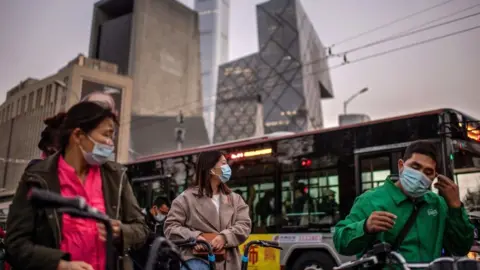China Communist Party plenum kicks off in Beijing
China has kicked off one of its most important political meetings of the year, held over four days in Beijing.
The fifth plenary session of the 19th Communist Party Central Committee will see China roll out its five-year economic and development plan.
But President Xi Jinping is also likely to unveil a longer-term plan for the next 15 years, called "Vision 2035".
This, say analysts, has prompted speculation that he intends to essentially be "president-for-life".
The aim of Vision 2035, says Benjamin Hillman, a professor at the Australian National University, is to "set goalposts for China's progress towards achieving high-income status [being a fully developed nation] by 2049".
Yet the "very idea of a 2035 manifesto has also prompted speculation that Xi intends to lead China through this period, becoming, essentially, president-for-life," he told the BBC.
China scrapped presidential term limits in 2018, which would allow Mr Xi to remain beyond his two terms.
More than 300 full and alternate members of the party's Central Committee are attending the meeting - the country's top leadership.
On the last day, China's state media agency will typically announce the details of what was agreed to over the meeting.
The meeting this year comes as China's economy is recovering from the virus outbreak, as life in most Chinese cities has returned to normal.
What do we expect to see this year?
The main thing is China's five-year plan from 2021-25, which will detail its policy and development priorities for the next five years.
China is the only major economy that publishes a five-year policy plan, and it has been doing so since 1953.
According to Prof Hillman, President Xi "wants the Chinese economy to become more self-sufficient and less reliant on US markets and technologies".
So we are likely to see more economic targets set for domestic consumption and also "shifting investment from low-cast manufacturing to high-cost technologies such as semi-conductors, renewable energy, medicine and space science".
Earlier this month, President Xi stressed the concept of the "dual-circulation" strategy - which aims to reduce China's dependence on foreign markets.
Professor Hoo Tiang Boon, of the Nanyang Technological University in Singapore, believes that this strategy is likely a direct response to the worsening relations between the US and China.
"I think China has come to the conclusion that [it] can't rely on the US and certainly the international environment," he told the BBC.
"Though that is not to say they will become insular... they will still latch on to opportunities they can find."
Is the virus likely to have any impact on the meeting?
Most likely not, says Prof Hillman.
 Getty Images
Getty Images"China is already coming out of the pandemic and there are signs that [its] economy is beginning to rebound," he says.
"The plenum will provide an opportunity to celebrate China's victory over the coronavirus, and Chinese state media will no doubt contrast the achievement with Europe's and America's ongoing failures to contain the virus."
According to latest official figures, China is now leading the charge for a global recovery based on its latest gross domestic product (GDP) data.
The world's second-biggest economy saw growth of 4.9% between July and September, compared to the same quarter last year.
However, the figure is lower than the 5.2% expected by economists.
Could we really see a president-for-life situation?
The announcement of a 15-year-plan has prompted some analysts to speculate that this could be possible.
However, Professor Hoo highlights that 2035 has in the past been hailed as the year that China sees the "basic realisation of socialist modernisation".
"In that sense, one interpretation is that it could be nothing unusual since it's been mentioned before in terms of China's development timeline," he told the BBC.
Though he added that historically, it is unusual for a longer-term plan to be discussed together with the five-year-plan.
However, the other interpretation is that Mr Xi intends to remain in charge for the long-run.
"There is speculation that it's a tacit message that Mr Xi intends to stay [the 15 years]... it would be convenient for his allies to say he needs to stay around to see through the plan," he said.
"It's quite clear that there is no obvious successor."
